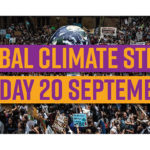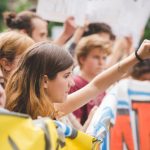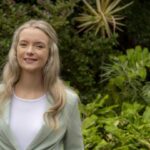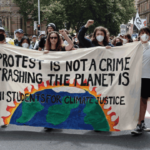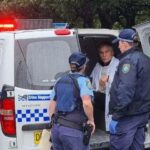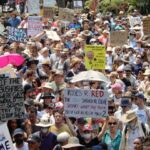“We’re Seeing No Substantial Change”: School Strike 4 Climate’s Ethan Lyons on a Viable Future
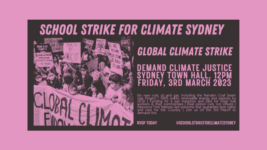
Students across NSW, across the continent and further, across the planet are walking out of their classrooms next Friday, 3 March 2023, to take part in a global strike, calling on governments worldwide to take the action drastically needed to prevent the escalating climate crisis from worsening.
Leading Earth Science Professor the late Will Steffen had warned that it’s likely not possible for humanity to prevent passing the key target of a 1.5°C temperature rise on preindustrial levels “due to past inaction”, and the entire globe now needs to be working to keep below the 2°C mark.
The Sydney Global Climate Strike is particularly pertinent as it’s being staged just weeks before the NSW state election is set to take place. And with a likely Labor win on the cards, questions are being asked about that party’s cosying up to Santos and the plans to frack the Pilliga in northern NSW.
Indeed, School Strike 4 Climate organisers are sending a clear message:“#WeWon’tSettle as communities, workers, young people and marginalised groups are exploited, while both the NSW Liberal and Labor parties continue to greenwash through duplicitous and callous actions.”
Inaction dressed up as progress
The climate action state of play has shifted under the Albanese government. The nation, which had become a chief climate criminal under Morrison, has been resurrected by Labor’s modest policy to cut greenhouse gas emissions by 2030.
And the national debate has now shifted to federal Labor’s yet to be implemented policy that aims to achieve the 2030 target via an overhaul of an Abbott-era emissions monitoring system, the Safeguard Mechanism, which is supposed to ensure facilities lower their greenhouse gas output.
Right now, the Safeguard Mechanism (Crediting) Amendment Bill 2022 is under parliamentary review. It aims to reform the mechanism so that it serves to lower emissions outputs and those businesses that stay below their baseline targets will be able to generate tradable carbon credits.
So, rather than ending the extraction of oil and gas to produce energy, Labor’s Safeguard Mechanism policy will permit extremely wealthy fossil fuel corporations to pay to offset any excess emissions they produce over their baseline targets.
For current and future generations
School Strike 4 Climate spokesperson Ethan Lyons is a 17-year-old Wiradjuri man, who lives in Sydney’s inner west, where he’s currently attending high school. The year 12 student has been organising the school strikes for three years now, and he’s helping to coordinate next week’s event.
Lyons stresses that the climate crisis is already upon us, as evidenced by the extreme weather events NSW has been plagued with over recent years. And he underscores that young people are set to bear the brunt of the crisis in years to come through no real fault of their own.
Sydney Criminal Lawyers spoke to School Strike 4 Climate spokesperson Ethan Lyons about the legacy older generations are leaving behind for today’s young people, the need for First Nations-led solutions to the crisis, and what students across Australia are demanding of adults.
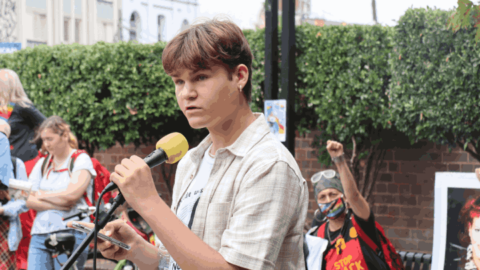
Ethan, School Strike 4 Climate is hosting the Global #ClimateStrike at Sydney Town Hall on 3 March. This was a movement started by Greta Thunberg in Sweden back in 2018.
So, how would you say humanity has progressed in terms of the climate emergency since the movement began?
I went to my first climate strike in 2020, which was the big one in Sydney with 80,000 people.
As a society, we’re now more aware of the climate crisis, but young people are still anxious about it. One in four young people have expressed a general state of worry and anxiety about climate.
In terms of progressing climate action, it’s been young people and grassroots organisations on the forefront making change.
We’ve seen crazy floods and unprecedented bushfires, but it’s not our leaders and governments trying to deal with this.
It’s grassroots people and those on the frontline of these disasters, who are putting in the hard yards to see progress.
Anxiety hasn’t disappeared since the hype around climate action increased. The crisis is still real. I wouldn’t say we’ve become complacent, but the feeling of anxiety is becoming very familiar.
Studies have shown that climate anxiety is real. And it’s present across schools especially.
Governments and leaders aren’t committing to young people, and the commitments that are made, aren’t helping the climate, which is building the anxiety.
This is all leading to a lot of hopelessness. Climate protests have been on the rise, but solutions from leaders have become stagnant.
School Strike 4 Climate is unique in that it’s a movement run by young people, and the student organisers and participants don’t have direct authority over the adult-run industries and policies that are exacerbating the climate crisis.
How would you say your generation considers the situation it finds itself in whereby the adults it’s dependent on are also destroying a viable future?
As young people, it’s important that we recognise that a lot of the adults who are exacerbating the climate crisis are complacent actors within institutions that contribute to the climate crisis, whether that is big banks or overarching systems, like capitalism.
Also, working with other young people, it’s obvious that we have been let down and left behind by our older generations, especially those with some sort of power, whether that’s people working in finance or government.
We’re not seeing a real change or commitment to younger people. It’s been really disheartening, especially when School Strike 4 Climate and other youth organisations are committing their whole high school lives towards mobilising over climate.
It’s discouraging to see adults not recognising this and continuing to work in careers that are destroying our viable future.
Something really interesting about this is that the adults who are contributing to the climate crisis have children.
We know that Scott Morrison and Anthony Albanese, our two last prime ministers, both have children.
So, you’d think there would be a parental instinct that would drive them to take climate action, as they have their children to care about.
But there’s no power in attacking individual adults about the climate crisis. There’s more nuance to this.
It’s about taking on the systems of oppression and the corporations that are allowing these adults to act in this way.
Recent years have seen drought, huge bushfires and devastating floods locally, while extreme weather events are now a constant around the globe. But there are those who still deny anything usual is happening.
In your understanding, how desperate is the climate crisis at present?
The climate crisis is here. The notion that it is a future event, or that it hasn’t happened yet, isn’t true.
The climate crisis has been impacting people for the last decade. We’ve seen huge floods and bushfires.
So, obviously, the climate crisis is here. And what we need is community action that’s authentic and practical.
We need solutions that are developed by the public sector and have First Nations input into them.
In 2030, it will be too late. If we have more coal and gas projects, the impact is going to be irreversible.
Another point is that the climate crisis isn’t just about the fires and the floods, it’s a broader crisis affecting First Nations people specifically.
So, while it may not be causing floods on First Nations land, it’s that connection to culture that’s being threatened and destroyed by the big coal and gas companies that are perpetuating the crisis.
The crisis is forcing marginalised communities onto the frontline, and that’s why it’s important to take action.
People who are most impacted by the climate crisis are always going to be First Nations people, people of colour, immigrants and refugees.
A second part of that point would be that the action that we do take needs to be led by these communities, because they know the solutions. They know what’s needed.
Santos has donated $83,000 to Labor. And Tanya Plibersek just greenlighted a Santos gas project that will continue to 2077. That’s insane. It’s in combination with Labor accepting 116 new gas wells.
And an important part of this is Santos, the big gas giant, has been fracking in the Pilliga.
The need to take action is important because it’s going to stop fires and floods. We need to support people impacted by the climate crisis.
Coal and gas are killing the planet. It’s making the rich richer and the poor poorer. Marginalised groups are being left behind.
We need these communities, we need these marginalised people, to bring their skills and passion to lead not only the climate movement but the future of Australia as a whole. We know the climate movement is a very diverse and intersectional movement.
A key point is the IPCC has said that to avert the catastrophic impacts of the climate crisis, we must limit our temperature rise to 1.5°C, but it’s also revealed that that temperature rise isn’t safe, it’s just the bare minimum.
Without climate action, through 2030 to 2050, climate change is expected to cause 250,000 additional deaths per year, which is insane, when you consider that this issue could be solved.
These are clear reasons why we need action for frontline communities and young people.
Under Morrison, this country was a global climate pariah. Since taking office last May, however, the Albanese government has made progress in setting the target of 43 percent emissions reduction by 2030.
But questions are now being raised in regard to the government’s proposed Safeguard Mechanism. How do you consider the Albanese government’s form in terms of climate action?
Forty three percent by 2030 isn’t enough. School Strike has been mobilising thousands on the street for the last five years to demand 100 percent emissions reduction by 2030.
Forty three percent is unambitious and it’s a slap in the face for young people who have been fighting for more. We have made it very clear that we want 100 percent reduction by 2030.
In terms of the Albanese government, we’ve seen these commitments and promises that, when you actually look into them, are nothing but blanket statements with no real policy or momentum behind them.
We know the Morrison government was bad. They were horrible on climate policy.
But we also know that now the Albanese government is in, they’re saying and acting like they care about the climate and young people, but these statements are just greenwashing. As I said, $83,000 from Santos was sent to Labor.
The Safeguard Mechanism was brought in by the Abbott government. And we know that anything from a Liberal government regarding climate is not effective or authentic.
What we’re seeing is that climate scientists have been saying that the Safeguard Mechanism is like state-sanctioned greenwashing. And young people are feeling that.
It’s been almost a year since Albanese’s been in and we’re not seeing First Nations-led solutions to the climate crisis. We aren’t seeing that commitment to 100 percent renewables and exports by 2030.
On the Safeguard Mechanism, when you look at it and strip it back for what it is, it’s something made with massive loopholes. Corporations can just buy carbon credits if they go over their limits.
It’s very dystopian. But this is the real thing. People are dying. There are communities, language groups and cultures being completely destroyed by the climate crisis.
The only solution this government is giving is revamped offset schemes, which supposedly gives companies tighter and tighter emissions limits every year, but actually allows them to pay their way to keep polluting.
There is a huge number of studies that show carbon credits aren’t a substitute for cutting emissions.
Only last year it was found that 70 to 80 percent of carbon credits going around Australia were low integrity, in other words, they were fake.
The Safeguard Mechanism doesn’t safeguard climate or young people. It allows companies to pay their way. And it is doing nothing to stop the 116 new coal and gas projects.
These are the same kind of policies that we have seen for the last decade, since climate has been high on the agenda for society.
But we’re seeing no substantial change. We’re seeing just a lot of long documents, motions and programs. Communities aren’t being involved. There are no First Nations-led climate solutions.
The climate commitments the Albanese government has made are unambitious. If this government is going to be in for the next three years, young people want to see more than just greenwashing from them.
We need to see a sustainable commitment to the climate crisis.
You’ve mentioned the Pilliga and the Narrabri gas project. In late December, the National Native Title Tribunal signed off on the Narrabri gas project, despite the Gomeroi Nation having spent the last decade campaigning and negotiating to stop this going ahead on its land.
As a First Nations man, how do you consider the institutions of government progressively signing off on the forced acquisition of Gomeroi Country in the third decade of the 21st century?
It’s not 1788. But we’re still seeing the same colonial acts of violence committed against First Nations people.
There is talk about a Voice to Parliament, which is a proposed commitment to First Nations people, but then the Labor government turns around and greenlights Santos. And it’s not vetoing the fracking of the Pilliga.
As a First Nations person, and also as a young person, I feel isolated and ignored.
This government is very good at acting like they care for young people and First Nations people, and this is leading society to think that’s what’s going on.
It’s disheartening going out and people thinking that our climate is safe, First Nations people are being cared for and our culture is a focus for government, while none of this is actually happening. This is very tough to deal with.
Especially with Gomeroi at the moment, the majority said no to the project. But it’s almost going ahead.
The fact is the majority of Gomeroi people said no, and you’d think that the government would take that and not go ahead with the project because they said no.
But instead, the political system shows plain ignorance and disrespect for our people and our culture. This was brought in with colonisation and it continues now.
When we talk about colonisation, when we look at earlier colonial times, there were acts of discrimination and violence against First Nations people, but now, in this day and age, we’re seeing the same kinds of acts of violence but in a very neat and tidy way, which is very sneaky.
It’s the ongoing system of colonialism in Australia. And governments are also working hand in hand with the banks. NAB is especially linked to Woodside, which is also linked to many projects on Aboriginal land.
As a First Nations young person, seeing all these institutions – governments, banks, high powers – just getting richer and profiting off our colonisation and our pain is hard.
You don’t have to speak to many people to know that who we are as people is intrinsically linked to our land. It’s at the core of everything.
We learn at school that Aboriginal people are very connected to our land, but the flipside of that is that they’re destroying that land. That’s hypocritical.
Personally, I feel very scared now. In the future, I’m at risk. But if I have children, it’s worrying to know how I’m going to be able to continue my culture and share my Country with new generations of Wiradjuri mob.
The government hasn’t cared for us. At the moment, they’re not carrying for us. They have completely left our people behind now and into the future.
And lastly, Ethan, Global #ClimateStrike rallies are taking place in cities across the continent, with thousands set to turn up.
So, in terms of forging change, what sorts of demands are School Strike 4 Climate and its supporters calling for on 3 March?
This strike wasn’t going to be national, but after Sydney called their strike, Hobart, Castlemaine, Canberra and Perth all called strikes.
And we have five demands. Three of these are what we normally demand. The first is no new coal and gas, like Narrabri or Kurri Kurri. The Perth team has added the Scarborough project to that as well.
Also, we’re calling for 100 percent publicly-owned renewable energy by 2030. We included the word public, because we know that renewables run by the systems of power aren’t going to be genuine.
We want renewables to be in public hands, so they’re community-led and operated.
Our third demand is funding for a just transition for workers and our communities. There are fossil fuel workers who recognise that the climate crisis is real. But they still need jobs to support their families and communities.
And on top of those three, we have two new ones. One demand is no more carbon offsets, but real carbon cuts.
We don’t want to see more disingenuous carbon offset schemes. We want to see coal and gas stopped. We want to see carbon emissions end.
That’s a really important demand with the NSW election coming. We have Tanya Plibersek as environmental minister.
We’re demanding that Labor commits to real action, not the Safeguard Mechanism. We want to pour all of that funding into real infrastructure and jobs that support climate action.
Our last demand is to resource First Nations-led solutions, guarantee land rights and care for Country.
First Nations people are at the forefront of the climate crisis, and they know the solutions. We’re the ones who contribute the least but are always the first and the worst.
We want First Nations-led solutions that also encompass land rights and guarantee care for Country.
This is also a First Nations movement, especially for Gomeroi at the moment, to resource and support these Indigenous solutions to the climate crisis.


